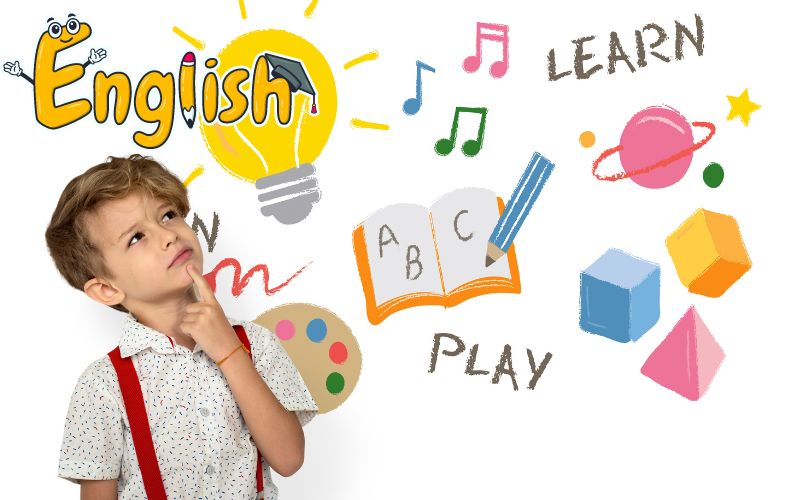In today’s globalized world, learning English has become an indispensable part of children’s comprehensive development. For parents, accompanying and supporting their children to start learning English from a basic level is not only a task but also an opportunity to expand their horizons of knowledge and skills. This not only helps children develop their language skills but also creates a solid foundation for their future in an increasingly connected and culturally diverse world.
The purpose of this article is to provide a detailed and easy-to-follow guide to help parents build an effective English learning plan for their children from a basic level. The article will introduce learning methods, resources, as well as tips and strategies to support children in this learning process. Learning English from an early age not only helps children develop their ability to communicate in an international environment, but also enhances their ability to think critically, be creative and understand different cultures.
Through this article, we hope to help parents realize the importance of learning English from a young age and equip them with the necessary tools to support their children on their journey to conquer this language. Let’s explore and build a solid foundation for children’s future through learning English.
1. Determine Current Level and Learning Goals

Before starting any English learning program for children, the first important thing that parents need to do is to determine their child’s current English proficiency. This can be done through basic tests, observing the child in daily communication, or even by talking to the child’s teacher (if any).
The aim is to understand the child’s listening, speaking, reading and writing abilities, and to identify strengths and areas for improvement. This not only helps to establish a suitable learning plan but also helps the child to progress systematically.
Once the current level has been assessed, the next step is to set specific and appropriate learning goals for the child.
This goal should reflect the child’s needs and abilities, and be challenging enough to encourage growth.
Learning goals can include learning new vocabulary every week, completing an English book every month, or entering English competitions for children. It is important that the goal is clear, measurable, and achievable within a certain time frame.
Setting the right goals is an important factor in your child’s English learning process. Goals not only provide a clear direction, but also help your child feel interested and motivated to learn.
When children achieve their goals, it is not only an improvement in language but also an important milestone that helps boost self-esteem and belief in their abilities.
For parents, monitoring and celebrating their children’s small achievements is also a way for them to participate and support their children in their English learning journey.
2. Choosing the Right English Learning Method for Children
When it comes to learning English for children, one of the most important factors is choosing the right learning method.
In today’s educational world, there are many different methods of learning English, from traditional to modern, each with its own distinct benefits.
Traditional learning methods such as face-to-face classes, textbooks, and homework focus on building a solid grammar foundation and rich vocabulary.
In contrast, modern methods such as learning through games, videos, and online applications focus on stimulating interest and interaction, helping children learn English in a natural and enjoyable way.
Combining traditional and modern learning methods can bring great benefits to children. This not only helps children have a solid grammar foundation and rich vocabulary, but also develops English listening and speaking skills naturally.
This combination also helps children become more flexible in learning language and applying it to everyday life.
Choosing the right learning method for each child should be based on the child’s interests, learning ability, and personality.
Some children learn better through interactive and creative learning, while others need the structure and system provided by traditional learning methods.
Parents can observe and experiment with different methods to determine which method works best for their child. The important thing is to create a positive learning environment where children can develop their English skills without feeling pressured or stressed.
Finally, when choosing an English learning method for children, parents should remember that each child is a unique individual.
Understanding and respecting these individual differences will help children not only learn English effectively, but also develop a lasting love of the language.
3. Global Link Language – Comprehensive Learning Environment

When it comes to learning English for children, the learning environment plays an important role.
At Global Link Language, we not only understand this but also provide a closed and comprehensive English learning environment through our YouTube and TikTok channels.
This channel is designed to support children at all levels, from beginners to advanced learners, with lessons built around specific educational pathways.
The videos on our channel are designed to be lively and engaging. This not only helps children learn English in a natural and fun way, but also helps them develop their language skills through games, puzzles and interactive activities.
The videos are designed with eye-catching colors, music and vivid images, helping children to be excited and focused while learning.
Using videos on Global Link Language’s YouTube and TikTok channels in your English learning process has many benefits.
It not only helps children learn English naturally but also develops listening and speaking skills through practical activities. Videos also provide a flexible learning method where children can learn anytime, anywhere, as long as there is an Internet connection.
This makes learning English easier and more convenient than ever.
In addition, our channel also provides lessons structured by topics, from basic to advanced, making it easy for children to follow and learn at the right pace.
With detailed and easy-to-understand instructions, children can learn English confidently and effectively, thereby improving their language skills.
At Global Link Language, we consider the wishes and concerns of parents not only as a responsibility but also as our mission.
With the main goal of building an ideal learning environment, we provide a variety of educational tools and methods to stimulate and develop children’s ability to absorb English in the most natural and effective way.
We believe that, with the right support and the right learning environment, every child can achieve success and confidently use English in everyday life.
4. Use Free Resources and Learning Tools
In the journey of teaching English to children, taking advantage of free resources and learning tools is an important factor.
Today, there are countless online English learning resources that parents can access at no cost. From language learning apps, educational websites, to YouTube and TikTok channels like Global Link Language, each resource offers a unique and engaging way to learn.
Some popular free English learning resources include online language games, flashcards, songs, stories, and interactive activities.
Apps like Duolingo, Babbel, or even educational games on platforms like Kahoot are also useful learning tools.
Additionally, educational websites like BBC Learning English offer a wide variety of lessons and learning materials for all ages.
Integrating learning tools into your child’s daily schedule is an important step. This not only exposes your child to English every day, but also keeps the learning process interesting and varied. Parents can create a weekly learning plan that incorporates the use of apps, watching educational videos, and practicing through games.
Each day can be set up with different learning activities, helping children not feel bored and always interested in learning.
Using a variety of learning resources not only helps children develop their language skills, but also helps them develop critical and creative thinking skills. Diverse resources provide different perspectives on language, from basic grammar and vocabulary to pronunciation and intonation.
This helps children learn English comprehensively, from theory to practice, and from reading and writing to listening and speaking.
In short, using free resources and learning tools is an indispensable part of the English learning process for children. Parents should explore and integrate these resources into their children’s daily learning plans, helping them develop their language skills and maintain their interest in learning.
5. Practice and Interaction

In the process of learning English, practice and interaction play an indispensable role, especially for children. When children are encouraged to use English in real-life situations, not only do their language skills develop, but they also improve their communication skills and confidence.
Regular practice helps reinforce what children have learned and discover how to use language naturally.
There are many different types of hands-on and interactive activities for children. One of the most effective ways is through games and group activities.
Games like “Simon Says,” vocabulary board games, or role-playing games can help children learn without feeling like they are learning.
Additionally, joining group classes or English clubs is also a great way for children to interact and learn from friends.
Encouraging children to speak and use English every day is also important. Parents can facilitate their children’s use of English in everyday life by asking questions, discussing familiar topics or telling stories in English before bedtime.
Encouraging children to watch English TV shows or cartoons is also a good way for them to become familiar with and learn the language.
Ultimately, creating an English-speaking environment at home is the best way for children to practice every day.
If possible, parents can set up an “English day” during the week where everyone in the family uses English together to communicate. This not only helps children improve their language skills but also helps the whole family have quality time together.
In short, daily practice and interaction are the keys to effective English learning for children. Parents need to create conditions and encourage children to use English every day, thereby helping them develop their language skills and communicate more confidently.
6. Support and Encouragement from Parents

Parents play an important role in supporting and encouraging their children’s English learning process. When children feel supported and encouraged, they often make faster progress and develop a positive attitude towards learning.
Parents are not only guides but also companions, helping children overcome difficulties and challenges in the learning process.
One of the most effective ways parents can support their children is to engage with them in the learning process. This could include watching English learning videos together, engaging in language games, or even learning alongside them.
This involvement not only strengthens the parent-child relationship, but also helps children feel that learning English is an enjoyable and valuable activity.
It is also important to create a positive learning environment at home. This includes creating a comfortable study space that avoids unnecessary pressure and stress.
Parents should encourage children to express their opinions, be creative, and ask questions. This helps children feel confident in expressing themselves and promotes interest in learning.
Finally, parents need to be aware of the importance of encouragement and praise. Sincere praise and encouragement when a child makes progress, even the smallest ones, can make a big difference in a child’s mood and motivation to learn.
At the same time, parents also need to listen and respond to their children’s needs, helping them overcome difficulties and continue to develop.
In short, the role of parents in their children’s English learning process cannot be denied.
Creating a positive and supportive learning environment will help children develop language skills and build confidence in their ability to learn.
7. Conclusion
As we come to the end of our journey of guiding parents to help their children learn English from the ground up, it is important to look back and summarize the key points and important tips.
First, identifying your current ability and setting specific learning goals is an important first step. Next, choosing the right learning method and taking advantage of free resources and learning tools will help your child approach English naturally and effectively.
Regular practice and interaction, along with support and encouragement from parents, will be key to the learning process.
The importance of supporting children to learn from the ground up cannot be overemphasized. This not only helps build a solid foundation for children but also helps them develop a love and passion for language.
Parents’ patience and companionship throughout this process not only helps children learn better but also strengthens the relationship between parents and children.
Finally, it is essential to encourage parents to remain patient and committed to accompanying their children on their English learning journey. Every step forward, no matter how small, deserves to be recognized and celebrated.
With the right support, children will not only learn English but also learn to love it and develop their confidence.








